Startup School 2017 from Y Combinator: “Why?” (part two)
“All the best startups that we funded at Y Combinator had an idea, and only then the startup itself.”
- Sam Altman

- I wanted to summarize today all the other things that will be addressed in the course. And since this is mostly a lecture from invited guests, this is my chance to talk about my beliefs. And I would like to start with what makes Silicon Valley so special. 100 people in an audience here at Stanford. There will be hundreds of thousands or millions of people around the world who watch this video online. And when I travel the world talking about startups, the most popular question I am asked is “Why Silicon Valley? What is happening there? What makes her different from others? Why can't we do this where I come from? ”
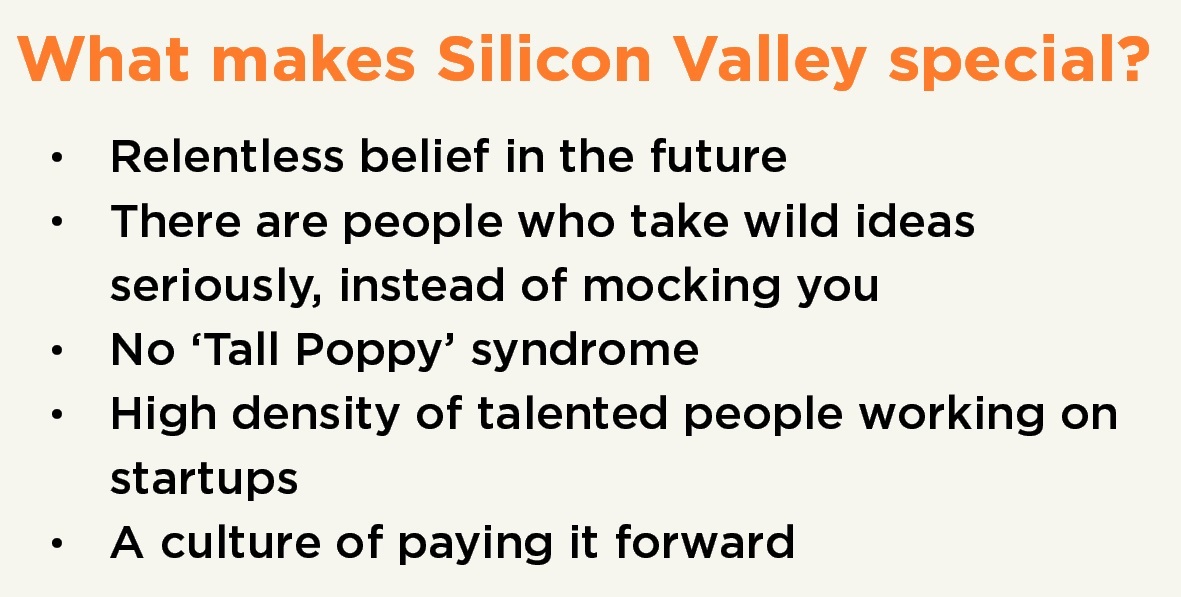
I think this is a cognitive question, even for people living here. Because you want to know what it is and surround yourself with its most concentrated version. The most important, in my opinion, is an implacable faith in the future. There are people here who take your crazy idea seriously instead of mocking you. That's because they figured out that giving up and saying that every idea is stupid would cost them a lot.
Therefore, if you have someone who says: “I will create an electric car company” and they know little about batteries, and even less about cars, it will be easy to write off. And yesterday, Tesla led Ford to the market. Therefore, people have found that you don’t want to write off these wild ideas about the future so quickly. You want to give them a chance. You want to think about them. And in many parts of the world and in the context of other professions you will simply be taunted behind your back or looking directly in your face, no matter.
You really want to find a small number of people in your life who will support your ambitions rather than belittle them.
And it's hard to find. This is not what is given by default. We do not realize how rare it is that we are in an environment where most people are just like that. This is not a tendency to criticize successful people. In many other countries, in many other cultures, there are words for the case when a person becomes too successful, too ambitious, too globally minded, and you cut them off. But in America there is not even a phrase for this, but in many other cultures there is.
There is also a high ratio of people working on startups and here is a culture that is ready to pay them back for it. People helped me with my startup, I will help them with their startup. And you want to surround yourself with this attitude, no matter where you are from. You may find out that you need to find this community online. You still want to do this. Oh, this is my old version of the slides. Did I send you a new one? Okay, let's stick to this one.
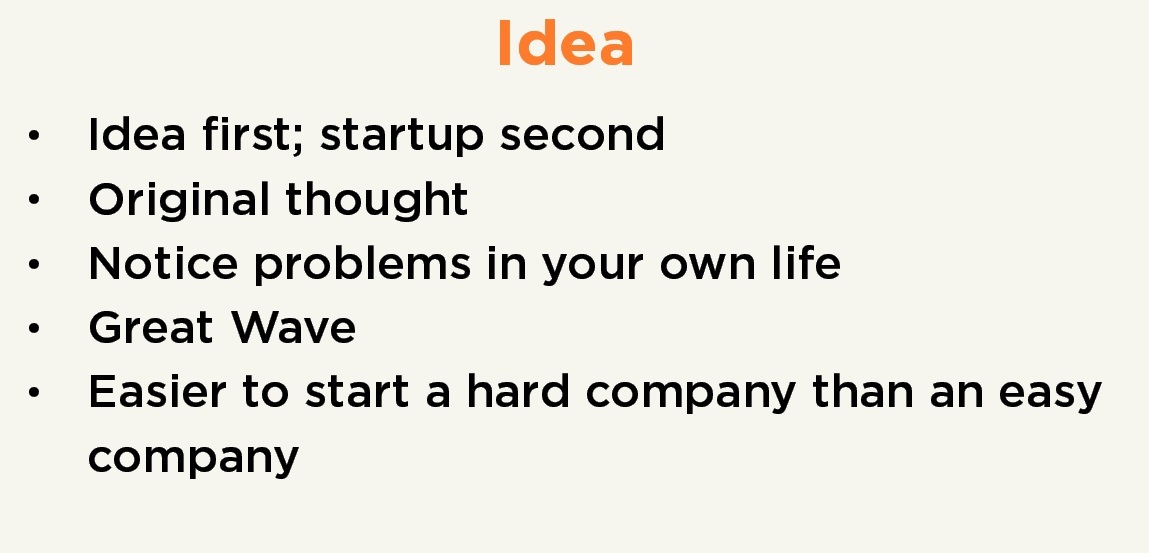
One of the things that should definitely be right for a startup is an idea. In Silicon Valley, a myth has developed that the idea is not important. That you have to create a startup, punch your way randomly and hope that you do something large-scale. But as Dustin said,all the best startups that we funded at Y Combinator, it was primarily an idea and only then the startup itself, it was not a number of pivots . Very few pivots were successful, and only if the creators in the process found out that there was some other idea that they caught fire more than the original. Or they revealed some new problem. The original thought is very difficult to reproduce well, but it is really important. The most successful startups were not derivative. They are not copies of anything that worked well. Many people are trying to create a copy of what worked well last year. I don’t know how many people created the Facebook clone a year after Facebook appeared. There must be a lot.
- Many.
- A lot, and not one of them has become something significant. The next Facebook never looks like Facebook; it looks like something completely different. And in order to succeed, you need to begin to notice problems in your own life. And the great advantage that you have as students is that students, in general, all young people, are generally aware of advanced technologies. You can predict another boom before it happens. And this boom idea, I believe, is the most important concept for identifying good ideas.
People are puzzled why startups form in such short periods of time. Why were there a number of startups, were there companies that were created in the late 90s, early 2000 and they were very successful? Why was there a number of startups that were created between 2009 and 2011 and they were very successful? And the reason for this hype is the Internet and mobile phones in these two cases, smartphones. Things that were previously impossible are suddenly possible. And when this happens, due to the fact that startups can develop quickly, you can do things that would have been impossible with a different outcome or that a large company would have won if everything had turned out differently. And you want to think about what will be the next boom.
My personal guess is thatit will be machine learning applicable to each vertical . I think this is the easiest way at the moment if you want to create a company. But you probably know that this is so much better than me. Whatever your peers do, whatever they like, even if it now looks like a toy, especially if it looks like a toy today, this is probably another boom. But you want to define it. What big technological tectonic shift will happen in the next couple of years? Do something that will enable it, and build on this platform. It’s also easier to create a difficult company than an easy one.
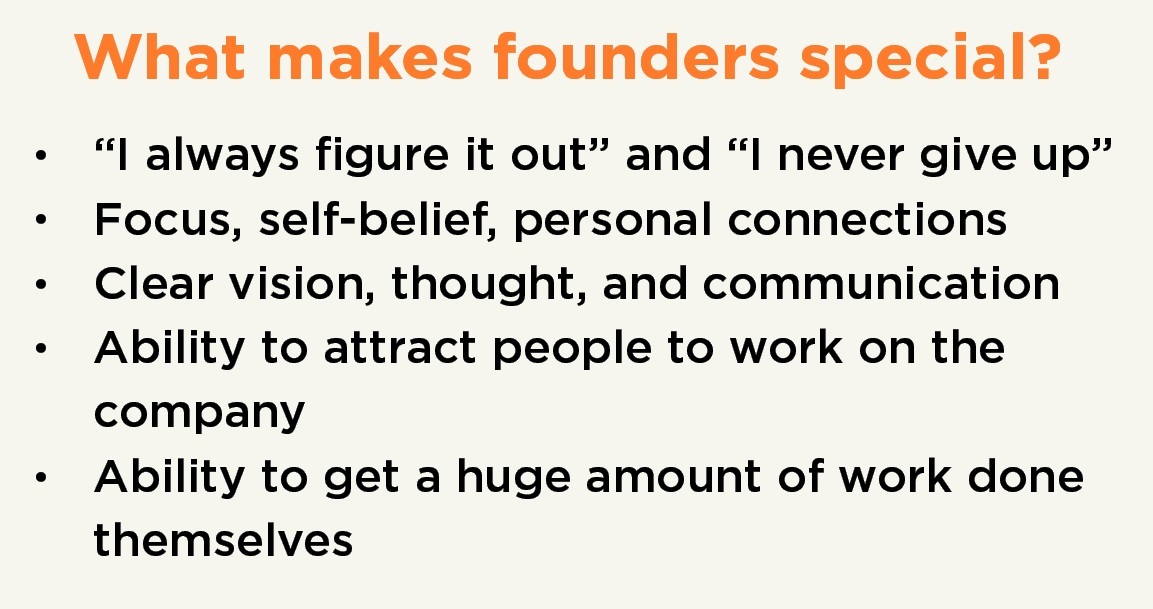
Most people, especially young people, want to choose something that doesn't sound too grand, doesn't sound too complicated. Because they believe that creating a company sounds like something very difficult. I'd rather choose the lightest company possible. But in fact, creating a company is always difficult, it will be equally difficult for you regardless of what you do. Although if you create a difficult company, if you inspire passionate people, if you build common artificial intelligence or supersonic planes or nuclear energy, you will have much more people interested in this than, for example, in the derivative idea of Facebook 1952. This idea which is easier to create a difficult company than an easy one, I think it's still a big secret in startups. But this is the idea that works, and I see it over and over again.
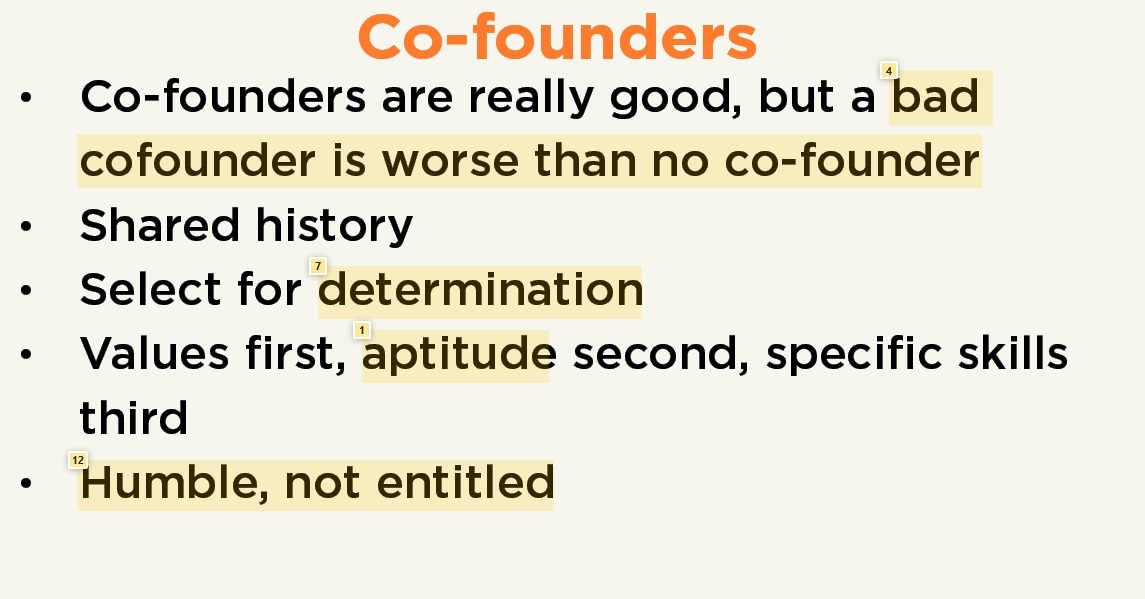
As Dustin mentioned, answering the question, the co-founders are very good. But a bad co-founder is much worse than his absence. Because there are so many people saying that you need a co-founder, there are people who will take a random person from the street and make him their co-founder. This is very bad. In fact, we did a little data analysis in Y Combinator and found that these random co-founders always bring 100% failure, 100%.
Do you need a shared story together. You want someone who is good at his job as you know, with whom you know that you can work and with whom you must. Many times in the course of a startup, the expected estimates of the fall line below the X axis. Temporarily. And now it is irrational to continue. But if you have a shared story and a relationship with someone, you will continue anyway, because you do not want to let your friend down. It is very important. You want to choose for determination.
Decisiveness is the most important value in the co-founderthat I have ever managed to identify. And that’s not what most people are looking for. Startups are very, very difficult. Purposeful people achieve what they want. In startups, the main thing is not to give up. When we talk with our best founders, they say something like “I always deal with this,” “I never give up,” and these are properties that actually work. This is not a picture that Dustin showed in the style of the movie "Mind Games", writing equations on the window. This is just persistent perseverance. And you keep trying, and ultimately it works. This should be with the co-founders. When I think of co-founders, I tell people to consider value first, then professional suitability, and finally certain skills. I think many people go in the opposite order. They think like this: I need a cofounder, who knows JavaScript, and x, and y. And you really want to meet someone who meets your expectations, especially with regard to determination.
You want someone with great potential and professional aptitude. And only then you think about certain skills. You want someone modest and unassuming. Someone asked Dustin what has changed in startups from 2004 to 2017. My answer to this question is that there are now more people than they want to do startups for the wrong reasons. They want to do it because it's cool. Such people would go to investment banking in 2004. You want modest and unassuming people who are ready to do whatever it takes. And they do it because they want to create this thing. They have an idea that they cannot let go. In this course, we have five lectures on the product, because all you have to do is make a great product.
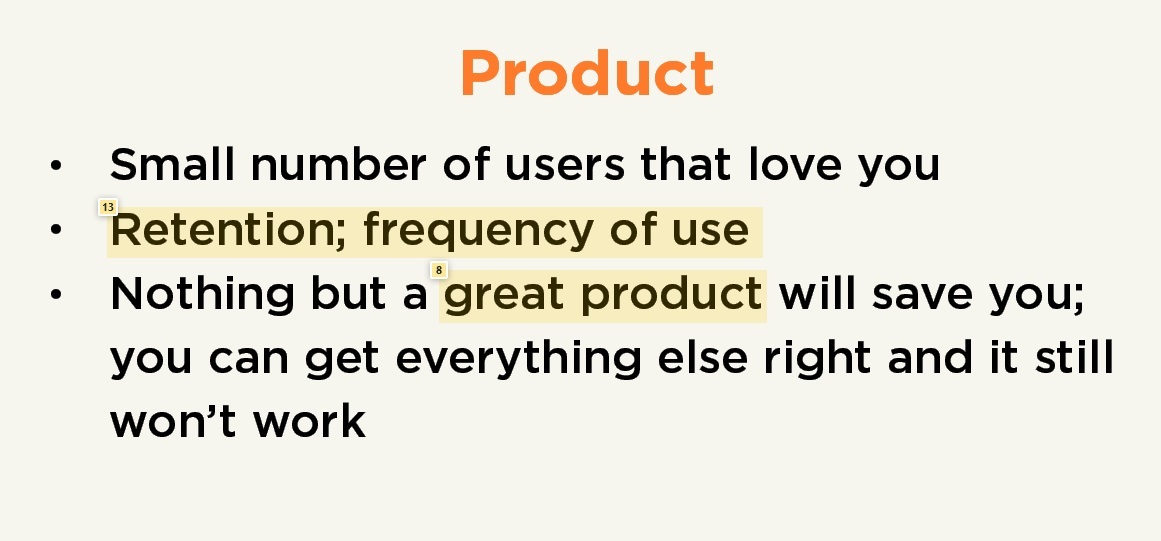
The only thing I want to mention now is what you need to consider when you think about the product you want to build. It is much more important to have a small number of users who love you than many users who simply like you. And almost all startups do not understand this. In the end, of course, you want a lot of users who really like your project. But this is almost impossible to achieve. In practice, you have two choices. You can delve into a narrow sphere and have a small number of users who will love you. And then you can figure out how to attract more and more such users and expand the application of the product. Or there may be many people who used your product once or twice, they kind of liked it and you are trying to figure out how to attract them again over time.
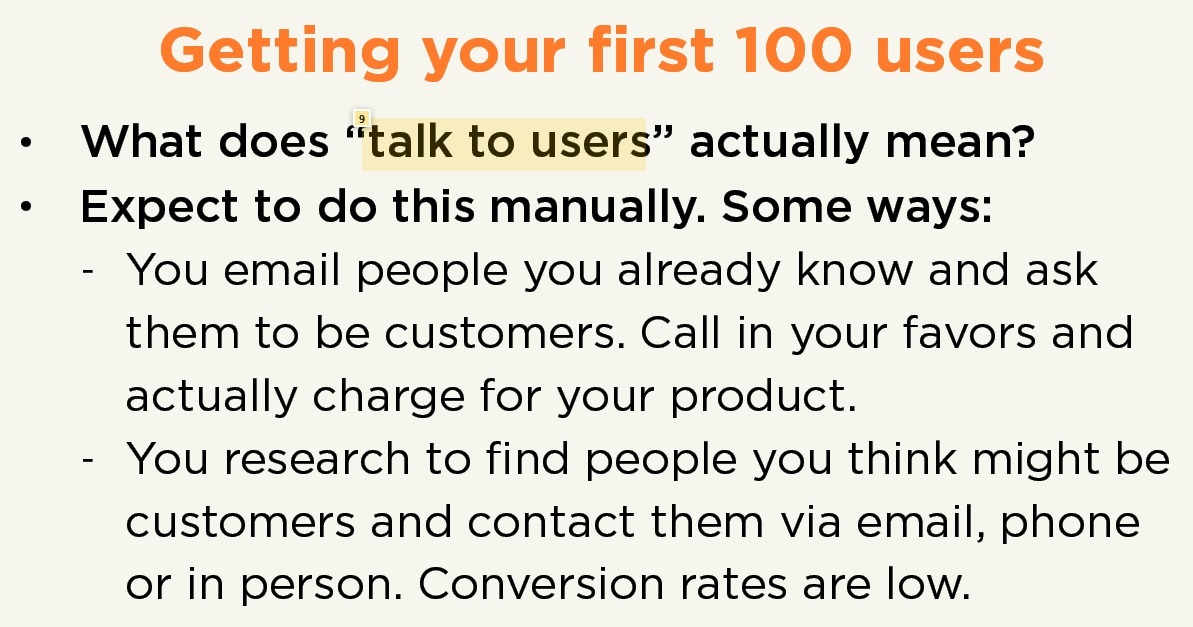
With great certainty, I can say that you want to start with a small number of users who really love you. Almost all great companies have products that were created that way. Think about those that you use in life, about products that are so good that you do not hesitate to tell your friends about them. Products that are so good that if they were closed, you would write a complaint to the company. That's what it really means to love a product.
A good indicator of this is storage and frequency of use. In fact, I think it is very important to understand that you should not monitor the growth and number of users in the early stages of a startup. You just have to keep track of how often they use it, we will have a lesson on scorecards later. You need to learn how to qualitatively analyze your scorecards and say to yourself: “Is this the user that I will save and who uses my product often? How can I compare this with other products in this area? ” This is a very good early indicator of users who love you. But it’s still better if they, without hesitation, advise their friends to purchase your product. But this is not the main idea. Nothing but a great product will save you.
We will talk about many other different things in this course and they are all significant. But if you do not have this, if you do not make a wonderful product, then nothing will come of it. You need several users to create a truly wonderful product. You cannot do this in a vacuum. You need people to talk to and iterate over. You need to find a small number of users to help you build this great product.
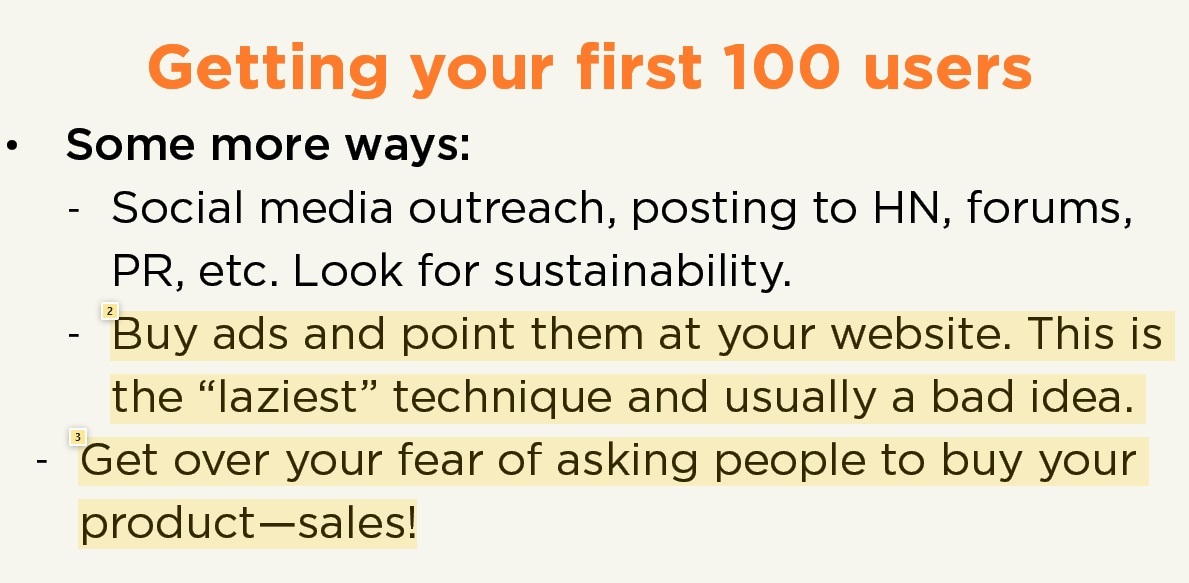
And one of the most common cliches in all startup tips is talking to your users. I learned that not all people understand what this means. Most people will say “oh, I have to talk to my users” and they call their user and say “hi, this is Sam, do you like my product?” And the user says: “yes, I like it, it's good.” People usually don't want to upset you. And you say, “Oh, great,” and hang up. This is what most founders do when I advise communicating with users. This is not what I mean.
Emmett Shire, who will later be one of the lecturers, very well interviews users and he will tell you about this later in detail. But you need to get to the bottom of the matter. And remember that people will be too nice with you. You need to find out what exactly they like. You need to see how they use it. You need to try to find out if they are doing something that seems strange to you, because they are trying to achieve something else? You should ask them if they recommended your product to anyone else? If not, why? Have you already paid me? If not, why? What is required for this? You need to get to the truth and talk about special characteristics, things that are used as something else. You need to talk about the times when they stopped using your product and started using some other product. Top level questions will not help you here. As for users, everyone thinks that they will launch the site, people will talk about this pair and things will go uphill. But this is not what usually happens.
There are four main strategies that will help you win the first hundred users. I will walk through them, from the best to the worst. You can write to people you already know and ask them to be your customers. You can offer them all the favors that come to your mind. You can offer this to someone with whom you took a course, to someone with whom you were friends at school. If this is a paid product, you must attack. This is important, remember, people will be inclined to fulfill your requests, and they will be too nice in conversation with you. Therefore, if it is a paid product, ask them to be your customers.
Another strategy is to research the people who you think will use your product and then write to them and ask them to try it out. Conversion factors are low here, about 2%, 3%. Therefore, you will need to do this with a lot of people. But you can send out letters and say "hey, I just made a new product, it would be great if you tried it." Most people want to be helpful. And probably they will. You can use social networks, Hacker News, forums, the press, whatever. If this is your growth strategy, you need to come up with a way to make it lasting, it should not be just one big explosion that everyone will quickly forget. Most people who do this understand that once it worked, and they call the journalist and say “hey, Could you write about me again? ” And the journalist asks:
- Has anything changed?
- No, but I really need users, please write about me.
The journalist will still say no.
Air BnB is an example of a company that has achieved success through a lengthy process. They did crazy things. They had one spectacular public statement after another. They sent huge oatmeal boxes to reporters, if only they had the opportunity to sit down again at their desk. And the mind managed to make this process long. But it is difficult.
And finally, the laziest and least impressive thing we can do is simply buy ads on Facebook or Google and direct people to your site. I do not recommend doing this. I do not know startups that have started well in this way. I put it on the list because it is an idea that many people are trying to follow. I want to conclude my talk by talking about building a great company before I answer a few questions.
We have already talked about this before. Getting to know your users is extremely important. The best founders themselves were engaged in customer support, they visited their users. They sat in their office if they could. In the case of AirBnB, they lived with them. You want to know your users very well. They have a short cyclic plan. The cycle here is this: talk with the client, understand the pain point, build a product that addresses it, put it in front of the user, ask him, see what he will do with the product and then repeat the cycle. This cycle is about how to iterate and improve your business. The law of complex growth is that if you can make your product 2% better after each iteration of the cycle, and you have a chance to use the iteration cycle every four hours or every four weeks,
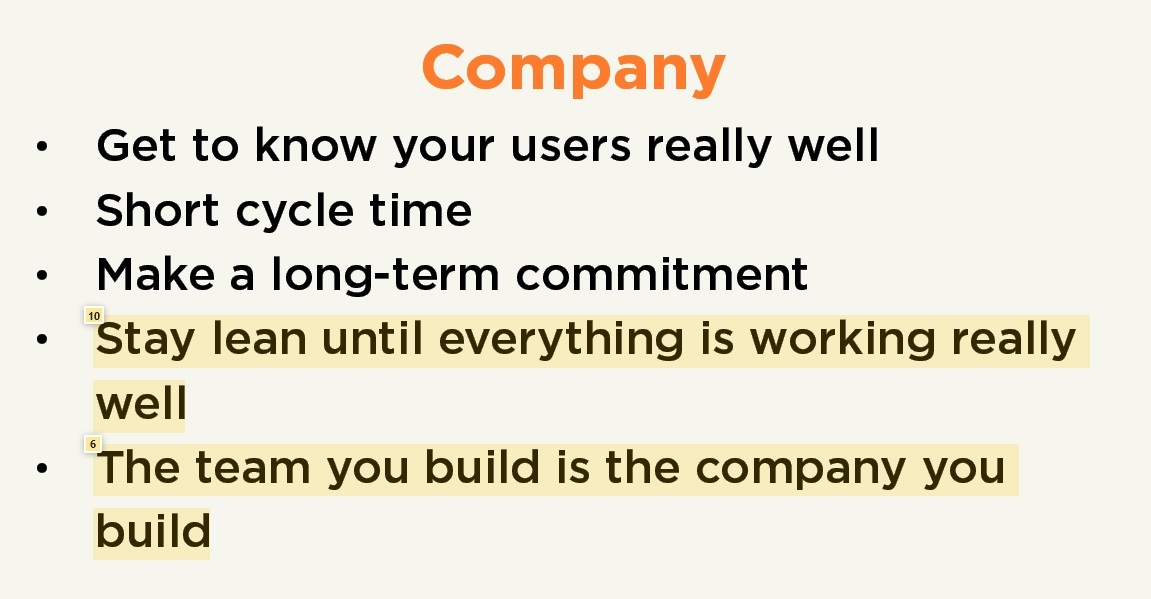
Make one of your main goals building the fastest performing iteration company the world has ever seen. You want to have a long term commitment. Most companies do not, majority of companies, especially if they are trying to create a light company, think within two or three years. Such things always require much more time, somehow this is almost always a 10-year project, if successful. And if you think so from the very beginning, you will make completely different and much more correct decisions.
I think this is the only arbitrage opportunity that has remained in the market. Almost no one makes long-term commitments in their new project. And if you do, you will think differently. You will hire other people and succeed. Speaking of hiring, content yourself with being small until things go uphill. I think this is somewhat bimodal. In the early stages, when you experiment and zigzag, you want to be like a fast small boat, and you want to be able to dramatically change the whole company. You cannot do this if you have a large company.
Money is spent on the side and this is another problem. The company’s vast capabilities are mostly reduced by the square of the number of employees. Therefore, you want to remain a very small company until you are sure that things are going uphill. Once things go uphill, you can become a very large company. And in fact, you need to become such a company. As soon as you switch to large-scale mode, you want to become a very large company as fast as possible and with great people on board. Because now you do not want to be a boat, you want to be an aircraft carrier, you want to be an armadillo. And you do not care that you can not turn as fast as before. You just want to roll everything into the asphalt. You want to be either in one mode or in another, and you will understand this.
At that moment when users literally beg you to give them your product and at that moment when you are sure that you have an excellent product that adapts to the market, then you can expand the company. When you get to this stage, beware of the temptation to hire ordinary people.
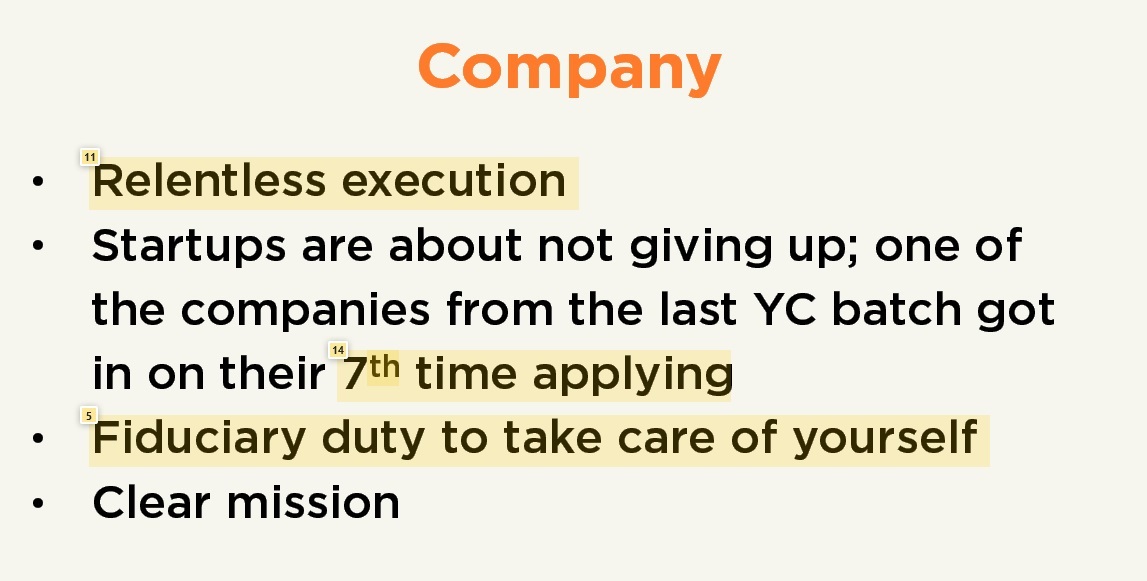
Linnet Khosla, who will be speaking here later on the course, has a saying that I love. It sounds like this: "the team you are building is the company you are building ." This is indeed so. I have not been aware of this for a very long time. If you put together a team of great people and you have a product that people love, you will have a 90% chance of success. Both are very difficult to do, and these are independent variables, but do not ignore the point about the command.
The best CEOs I know spend a lot of time recruiting and retaining their talent. Tell me, how much time did you spend on this?
- Approximately 40-50%.
40-50%! This is Dustin Moskovits, he does not need to do anything that he does not want to do, and he decides to spend half his time on recruiting staff and retaining employees. If Dustin can do this, you probably all should do it too. Every CEO I met has an excuse as to why they spent only 5% of their time on team building. This is always a very good reason, but always such companies tend to fail. Invest in it. Continuous execution. This is a topic that we will talk a lot about. But you need not to stop and keep moving forward. And you need to do everything perfectly. And you need to properly consider all the details. You need to be very careful about every experience that a client has with your company.
There is a book called The Score Takes Care of Itself, read it. She is very good. It is about how important it is to take all the details into account correctly and just inexorably move forward as fast as you can. Startups are about not giving up to the extent that most people do not have a good intuitive understanding. One of the best companies in the YC group, he applied seven times before being hired. Most people, if you refuse them six times, will not come to you in the seventh. This is an option of what happens in startups all the time, they will knock you down again, again and again. It is like the last time you were pushed, you think that you no longer have the strength to rise ... And then you suddenly succeed. This is what you sign up for when you create a startup. Remember that if it's a 10 year marathon, You have a duty to your caregivers to take care of yourself. Some people sit at a startup night away. They do not take good care of their health. They do not sleep. They do not maintain personal relationships.
True, startups are a poor choice for a balance between work and life. There are always posts about how I changed the world with my startup, working only 2 hours a day and kitesurfing for the remaining time. For some reason, these people are always not one of those who have a great influence. They just talk a lot. Startups are very difficult. You have a duty to yourself, to the team, to investors, to take care of yourself and not to neglect your health, your well-being and everything else ... your life, your personal relationships. And then just work. You do not have to figure it out on the first day. But most of the most successful startups, of which I was fortunate to be a participant, did it quite quickly ... In the first year or in the first two years, they determine their main task. It is this task that makes you join them,
The media writes about them. And even if you start with a project that is just interesting to you and solves problems in your life, you should start that way. Remember that at some point, you should have a clear goal. You must become a great evangelist for this mission. Another skill that is not made in this version of the slides is that you must be a great conversationalist. You need to communicate information to other people in an accessible way, to think clearly, this is your clear task. This is what will convince people to help you. So you adjust your idea to a huge list of characteristics. This huge company and all those people who love your product. Okay. It took me more time than I expected. I have about two minutes left to answer the questions, if you have any.
- I was always interested in that. If you have two people to hire. One is very passionate about what you create, but he lacks the necessary skills. The other is doing very well that you are not strong, but not so much interested in your idea. Who should I choose?
“And so, you need to choose who to hire.” One is very passionate about your idea and valuable, but not suitable due to lack of good skills. Another has excellent skills, but is not particularly interested in your idea. First of all, we take into account the value of the employee, then professional suitability and only then certain skills. If you can get a pretty smart employee who shares your views and your goal and believes in what you are doing, then he can learn the skills. This is a truth that has never failed me.
- How to learn to come up with good ideas?
- How to learn to come up with good ideas? First, practice a lot and tell people about your ideas. And be prepared for them to say that your idea is terrible. I think good ideas are not solo work. You want to find a group of smart people to whom you can throw your thoughts and say: “Hey, I noticed that it was terrible. What can we do about it? ” You do not just sit in the room and do not write with a white marker on the window the ideas that came to your mind.
Good ideas come because you communicate with people.
You have smart friends and colleagues, and you solve the problem together, think about ideas. I would say, notice problems in life, even if you have no solution, just discuss the problem and try to come up with something. Something else. Ideas are very fragile. When you find this particular group of people with whom you can discuss ideas, you want people who don’t immediately criticize a raw, unformed idea. You want people who will tell you: "Well, yes ... But what if we try to do something else." You do not want people who will tell you: "That sounds stupid." You want people who will tell you: “It sounds crazy and is unlikely to work, but imagine what a splash it will make if it does work.” You need a person with this attitude. And then how can we figure out how to bring to life what you want? I would say notice problems get people with whom we can discuss them. Do you have something to add? Ok, next. One more question.
- It revolves around fundraising. How do you know it's time to start fundraising?
- How to understand that the time has come to start raising funds? We will have a whole lesson dedicated to this. But in general, if you can raise money and it's easy ... If people desperately want to give you money on good terms, maybe this is a good moment to accept it. Another question, of course, is whether you need money? When you need money, you have to take it, regardless of the conditions that offer you. In general, you want you to have progress that will justify the funding you need. When you have enough progress and you need money, because you can easily raise money at this moment, then this is the best time to start raising funds. But again, this is a difficult question. We will have a whole lecture on it. Okay, one more.
- How do you decide when to switch from search mode and switch to risk mode?
- How to decide when to switch from a state where you are just messing around trying to get an excellent product that would take root in the market, to a state where you are really expanding the company? You will understand. Everyone is always interested in how to understand that this is the right moment. If you run around the office 80 hours a week, tear your hair out, and people love your product so much that you don’t have time to produce it fast enough, then this is the very moment. I have never met anyone who did not understand at this moment. Good. On Thursday, we will have a lesson on startup startup financial mechanics .
And thank you very much.

Translation: Diana Sheremyeva
To be continued
Full video: A new video has been released . Who wants to help with the translation - write.

- Sam Altman

- I wanted to summarize today all the other things that will be addressed in the course. And since this is mostly a lecture from invited guests, this is my chance to talk about my beliefs. And I would like to start with what makes Silicon Valley so special. 100 people in an audience here at Stanford. There will be hundreds of thousands or millions of people around the world who watch this video online. And when I travel the world talking about startups, the most popular question I am asked is “Why Silicon Valley? What is happening there? What makes her different from others? Why can't we do this where I come from? ”

I think this is a cognitive question, even for people living here. Because you want to know what it is and surround yourself with its most concentrated version. The most important, in my opinion, is an implacable faith in the future. There are people here who take your crazy idea seriously instead of mocking you. That's because they figured out that giving up and saying that every idea is stupid would cost them a lot.
Therefore, if you have someone who says: “I will create an electric car company” and they know little about batteries, and even less about cars, it will be easy to write off. And yesterday, Tesla led Ford to the market. Therefore, people have found that you don’t want to write off these wild ideas about the future so quickly. You want to give them a chance. You want to think about them. And in many parts of the world and in the context of other professions you will simply be taunted behind your back or looking directly in your face, no matter.
You really want to find a small number of people in your life who will support your ambitions rather than belittle them.
And it's hard to find. This is not what is given by default. We do not realize how rare it is that we are in an environment where most people are just like that. This is not a tendency to criticize successful people. In many other countries, in many other cultures, there are words for the case when a person becomes too successful, too ambitious, too globally minded, and you cut them off. But in America there is not even a phrase for this, but in many other cultures there is.
There is also a high ratio of people working on startups and here is a culture that is ready to pay them back for it. People helped me with my startup, I will help them with their startup. And you want to surround yourself with this attitude, no matter where you are from. You may find out that you need to find this community online. You still want to do this. Oh, this is my old version of the slides. Did I send you a new one? Okay, let's stick to this one.

One of the things that should definitely be right for a startup is an idea. In Silicon Valley, a myth has developed that the idea is not important. That you have to create a startup, punch your way randomly and hope that you do something large-scale. But as Dustin said,all the best startups that we funded at Y Combinator, it was primarily an idea and only then the startup itself, it was not a number of pivots . Very few pivots were successful, and only if the creators in the process found out that there was some other idea that they caught fire more than the original. Or they revealed some new problem. The original thought is very difficult to reproduce well, but it is really important. The most successful startups were not derivative. They are not copies of anything that worked well. Many people are trying to create a copy of what worked well last year. I don’t know how many people created the Facebook clone a year after Facebook appeared. There must be a lot.
- Many.
- A lot, and not one of them has become something significant. The next Facebook never looks like Facebook; it looks like something completely different. And in order to succeed, you need to begin to notice problems in your own life. And the great advantage that you have as students is that students, in general, all young people, are generally aware of advanced technologies. You can predict another boom before it happens. And this boom idea, I believe, is the most important concept for identifying good ideas.
People are puzzled why startups form in such short periods of time. Why were there a number of startups, were there companies that were created in the late 90s, early 2000 and they were very successful? Why was there a number of startups that were created between 2009 and 2011 and they were very successful? And the reason for this hype is the Internet and mobile phones in these two cases, smartphones. Things that were previously impossible are suddenly possible. And when this happens, due to the fact that startups can develop quickly, you can do things that would have been impossible with a different outcome or that a large company would have won if everything had turned out differently. And you want to think about what will be the next boom.
My personal guess is thatit will be machine learning applicable to each vertical . I think this is the easiest way at the moment if you want to create a company. But you probably know that this is so much better than me. Whatever your peers do, whatever they like, even if it now looks like a toy, especially if it looks like a toy today, this is probably another boom. But you want to define it. What big technological tectonic shift will happen in the next couple of years? Do something that will enable it, and build on this platform. It’s also easier to create a difficult company than an easy one.

Most people, especially young people, want to choose something that doesn't sound too grand, doesn't sound too complicated. Because they believe that creating a company sounds like something very difficult. I'd rather choose the lightest company possible. But in fact, creating a company is always difficult, it will be equally difficult for you regardless of what you do. Although if you create a difficult company, if you inspire passionate people, if you build common artificial intelligence or supersonic planes or nuclear energy, you will have much more people interested in this than, for example, in the derivative idea of Facebook 1952. This idea which is easier to create a difficult company than an easy one, I think it's still a big secret in startups. But this is the idea that works, and I see it over and over again.

As Dustin mentioned, answering the question, the co-founders are very good. But a bad co-founder is much worse than his absence. Because there are so many people saying that you need a co-founder, there are people who will take a random person from the street and make him their co-founder. This is very bad. In fact, we did a little data analysis in Y Combinator and found that these random co-founders always bring 100% failure, 100%.
Do you need a shared story together. You want someone who is good at his job as you know, with whom you know that you can work and with whom you must. Many times in the course of a startup, the expected estimates of the fall line below the X axis. Temporarily. And now it is irrational to continue. But if you have a shared story and a relationship with someone, you will continue anyway, because you do not want to let your friend down. It is very important. You want to choose for determination.
Decisiveness is the most important value in the co-founderthat I have ever managed to identify. And that’s not what most people are looking for. Startups are very, very difficult. Purposeful people achieve what they want. In startups, the main thing is not to give up. When we talk with our best founders, they say something like “I always deal with this,” “I never give up,” and these are properties that actually work. This is not a picture that Dustin showed in the style of the movie "Mind Games", writing equations on the window. This is just persistent perseverance. And you keep trying, and ultimately it works. This should be with the co-founders. When I think of co-founders, I tell people to consider value first, then professional suitability, and finally certain skills. I think many people go in the opposite order. They think like this: I need a cofounder, who knows JavaScript, and x, and y. And you really want to meet someone who meets your expectations, especially with regard to determination.
You want someone with great potential and professional aptitude. And only then you think about certain skills. You want someone modest and unassuming. Someone asked Dustin what has changed in startups from 2004 to 2017. My answer to this question is that there are now more people than they want to do startups for the wrong reasons. They want to do it because it's cool. Such people would go to investment banking in 2004. You want modest and unassuming people who are ready to do whatever it takes. And they do it because they want to create this thing. They have an idea that they cannot let go. In this course, we have five lectures on the product, because all you have to do is make a great product.

The only thing I want to mention now is what you need to consider when you think about the product you want to build. It is much more important to have a small number of users who love you than many users who simply like you. And almost all startups do not understand this. In the end, of course, you want a lot of users who really like your project. But this is almost impossible to achieve. In practice, you have two choices. You can delve into a narrow sphere and have a small number of users who will love you. And then you can figure out how to attract more and more such users and expand the application of the product. Or there may be many people who used your product once or twice, they kind of liked it and you are trying to figure out how to attract them again over time.

With great certainty, I can say that you want to start with a small number of users who really love you. Almost all great companies have products that were created that way. Think about those that you use in life, about products that are so good that you do not hesitate to tell your friends about them. Products that are so good that if they were closed, you would write a complaint to the company. That's what it really means to love a product.
A good indicator of this is storage and frequency of use. In fact, I think it is very important to understand that you should not monitor the growth and number of users in the early stages of a startup. You just have to keep track of how often they use it, we will have a lesson on scorecards later. You need to learn how to qualitatively analyze your scorecards and say to yourself: “Is this the user that I will save and who uses my product often? How can I compare this with other products in this area? ” This is a very good early indicator of users who love you. But it’s still better if they, without hesitation, advise their friends to purchase your product. But this is not the main idea. Nothing but a great product will save you.
We will talk about many other different things in this course and they are all significant. But if you do not have this, if you do not make a wonderful product, then nothing will come of it. You need several users to create a truly wonderful product. You cannot do this in a vacuum. You need people to talk to and iterate over. You need to find a small number of users to help you build this great product.

And one of the most common cliches in all startup tips is talking to your users. I learned that not all people understand what this means. Most people will say “oh, I have to talk to my users” and they call their user and say “hi, this is Sam, do you like my product?” And the user says: “yes, I like it, it's good.” People usually don't want to upset you. And you say, “Oh, great,” and hang up. This is what most founders do when I advise communicating with users. This is not what I mean.
Emmett Shire, who will later be one of the lecturers, very well interviews users and he will tell you about this later in detail. But you need to get to the bottom of the matter. And remember that people will be too nice with you. You need to find out what exactly they like. You need to see how they use it. You need to try to find out if they are doing something that seems strange to you, because they are trying to achieve something else? You should ask them if they recommended your product to anyone else? If not, why? Have you already paid me? If not, why? What is required for this? You need to get to the truth and talk about special characteristics, things that are used as something else. You need to talk about the times when they stopped using your product and started using some other product. Top level questions will not help you here. As for users, everyone thinks that they will launch the site, people will talk about this pair and things will go uphill. But this is not what usually happens.
There are four main strategies that will help you win the first hundred users. I will walk through them, from the best to the worst. You can write to people you already know and ask them to be your customers. You can offer them all the favors that come to your mind. You can offer this to someone with whom you took a course, to someone with whom you were friends at school. If this is a paid product, you must attack. This is important, remember, people will be inclined to fulfill your requests, and they will be too nice in conversation with you. Therefore, if it is a paid product, ask them to be your customers.
Another strategy is to research the people who you think will use your product and then write to them and ask them to try it out. Conversion factors are low here, about 2%, 3%. Therefore, you will need to do this with a lot of people. But you can send out letters and say "hey, I just made a new product, it would be great if you tried it." Most people want to be helpful. And probably they will. You can use social networks, Hacker News, forums, the press, whatever. If this is your growth strategy, you need to come up with a way to make it lasting, it should not be just one big explosion that everyone will quickly forget. Most people who do this understand that once it worked, and they call the journalist and say “hey, Could you write about me again? ” And the journalist asks:
- Has anything changed?
- No, but I really need users, please write about me.
The journalist will still say no.
Air BnB is an example of a company that has achieved success through a lengthy process. They did crazy things. They had one spectacular public statement after another. They sent huge oatmeal boxes to reporters, if only they had the opportunity to sit down again at their desk. And the mind managed to make this process long. But it is difficult.
And finally, the laziest and least impressive thing we can do is simply buy ads on Facebook or Google and direct people to your site. I do not recommend doing this. I do not know startups that have started well in this way. I put it on the list because it is an idea that many people are trying to follow. I want to conclude my talk by talking about building a great company before I answer a few questions.
We have already talked about this before. Getting to know your users is extremely important. The best founders themselves were engaged in customer support, they visited their users. They sat in their office if they could. In the case of AirBnB, they lived with them. You want to know your users very well. They have a short cyclic plan. The cycle here is this: talk with the client, understand the pain point, build a product that addresses it, put it in front of the user, ask him, see what he will do with the product and then repeat the cycle. This cycle is about how to iterate and improve your business. The law of complex growth is that if you can make your product 2% better after each iteration of the cycle, and you have a chance to use the iteration cycle every four hours or every four weeks,

Make one of your main goals building the fastest performing iteration company the world has ever seen. You want to have a long term commitment. Most companies do not, majority of companies, especially if they are trying to create a light company, think within two or three years. Such things always require much more time, somehow this is almost always a 10-year project, if successful. And if you think so from the very beginning, you will make completely different and much more correct decisions.
I think this is the only arbitrage opportunity that has remained in the market. Almost no one makes long-term commitments in their new project. And if you do, you will think differently. You will hire other people and succeed. Speaking of hiring, content yourself with being small until things go uphill. I think this is somewhat bimodal. In the early stages, when you experiment and zigzag, you want to be like a fast small boat, and you want to be able to dramatically change the whole company. You cannot do this if you have a large company.
Money is spent on the side and this is another problem. The company’s vast capabilities are mostly reduced by the square of the number of employees. Therefore, you want to remain a very small company until you are sure that things are going uphill. Once things go uphill, you can become a very large company. And in fact, you need to become such a company. As soon as you switch to large-scale mode, you want to become a very large company as fast as possible and with great people on board. Because now you do not want to be a boat, you want to be an aircraft carrier, you want to be an armadillo. And you do not care that you can not turn as fast as before. You just want to roll everything into the asphalt. You want to be either in one mode or in another, and you will understand this.
At that moment when users literally beg you to give them your product and at that moment when you are sure that you have an excellent product that adapts to the market, then you can expand the company. When you get to this stage, beware of the temptation to hire ordinary people.

Linnet Khosla, who will be speaking here later on the course, has a saying that I love. It sounds like this: "the team you are building is the company you are building ." This is indeed so. I have not been aware of this for a very long time. If you put together a team of great people and you have a product that people love, you will have a 90% chance of success. Both are very difficult to do, and these are independent variables, but do not ignore the point about the command.
The best CEOs I know spend a lot of time recruiting and retaining their talent. Tell me, how much time did you spend on this?
- Approximately 40-50%.
40-50%! This is Dustin Moskovits, he does not need to do anything that he does not want to do, and he decides to spend half his time on recruiting staff and retaining employees. If Dustin can do this, you probably all should do it too. Every CEO I met has an excuse as to why they spent only 5% of their time on team building. This is always a very good reason, but always such companies tend to fail. Invest in it. Continuous execution. This is a topic that we will talk a lot about. But you need not to stop and keep moving forward. And you need to do everything perfectly. And you need to properly consider all the details. You need to be very careful about every experience that a client has with your company.
There is a book called The Score Takes Care of Itself, read it. She is very good. It is about how important it is to take all the details into account correctly and just inexorably move forward as fast as you can. Startups are about not giving up to the extent that most people do not have a good intuitive understanding. One of the best companies in the YC group, he applied seven times before being hired. Most people, if you refuse them six times, will not come to you in the seventh. This is an option of what happens in startups all the time, they will knock you down again, again and again. It is like the last time you were pushed, you think that you no longer have the strength to rise ... And then you suddenly succeed. This is what you sign up for when you create a startup. Remember that if it's a 10 year marathon, You have a duty to your caregivers to take care of yourself. Some people sit at a startup night away. They do not take good care of their health. They do not sleep. They do not maintain personal relationships.
True, startups are a poor choice for a balance between work and life. There are always posts about how I changed the world with my startup, working only 2 hours a day and kitesurfing for the remaining time. For some reason, these people are always not one of those who have a great influence. They just talk a lot. Startups are very difficult. You have a duty to yourself, to the team, to investors, to take care of yourself and not to neglect your health, your well-being and everything else ... your life, your personal relationships. And then just work. You do not have to figure it out on the first day. But most of the most successful startups, of which I was fortunate to be a participant, did it quite quickly ... In the first year or in the first two years, they determine their main task. It is this task that makes you join them,
The media writes about them. And even if you start with a project that is just interesting to you and solves problems in your life, you should start that way. Remember that at some point, you should have a clear goal. You must become a great evangelist for this mission. Another skill that is not made in this version of the slides is that you must be a great conversationalist. You need to communicate information to other people in an accessible way, to think clearly, this is your clear task. This is what will convince people to help you. So you adjust your idea to a huge list of characteristics. This huge company and all those people who love your product. Okay. It took me more time than I expected. I have about two minutes left to answer the questions, if you have any.
- I was always interested in that. If you have two people to hire. One is very passionate about what you create, but he lacks the necessary skills. The other is doing very well that you are not strong, but not so much interested in your idea. Who should I choose?
“And so, you need to choose who to hire.” One is very passionate about your idea and valuable, but not suitable due to lack of good skills. Another has excellent skills, but is not particularly interested in your idea. First of all, we take into account the value of the employee, then professional suitability and only then certain skills. If you can get a pretty smart employee who shares your views and your goal and believes in what you are doing, then he can learn the skills. This is a truth that has never failed me.
- How to learn to come up with good ideas?
- How to learn to come up with good ideas? First, practice a lot and tell people about your ideas. And be prepared for them to say that your idea is terrible. I think good ideas are not solo work. You want to find a group of smart people to whom you can throw your thoughts and say: “Hey, I noticed that it was terrible. What can we do about it? ” You do not just sit in the room and do not write with a white marker on the window the ideas that came to your mind.
Good ideas come because you communicate with people.
You have smart friends and colleagues, and you solve the problem together, think about ideas. I would say, notice problems in life, even if you have no solution, just discuss the problem and try to come up with something. Something else. Ideas are very fragile. When you find this particular group of people with whom you can discuss ideas, you want people who don’t immediately criticize a raw, unformed idea. You want people who will tell you: "Well, yes ... But what if we try to do something else." You do not want people who will tell you: "That sounds stupid." You want people who will tell you: “It sounds crazy and is unlikely to work, but imagine what a splash it will make if it does work.” You need a person with this attitude. And then how can we figure out how to bring to life what you want? I would say notice problems get people with whom we can discuss them. Do you have something to add? Ok, next. One more question.
- It revolves around fundraising. How do you know it's time to start fundraising?
- How to understand that the time has come to start raising funds? We will have a whole lesson dedicated to this. But in general, if you can raise money and it's easy ... If people desperately want to give you money on good terms, maybe this is a good moment to accept it. Another question, of course, is whether you need money? When you need money, you have to take it, regardless of the conditions that offer you. In general, you want you to have progress that will justify the funding you need. When you have enough progress and you need money, because you can easily raise money at this moment, then this is the best time to start raising funds. But again, this is a difficult question. We will have a whole lecture on it. Okay, one more.
- How do you decide when to switch from search mode and switch to risk mode?
- How to decide when to switch from a state where you are just messing around trying to get an excellent product that would take root in the market, to a state where you are really expanding the company? You will understand. Everyone is always interested in how to understand that this is the right moment. If you run around the office 80 hours a week, tear your hair out, and people love your product so much that you don’t have time to produce it fast enough, then this is the very moment. I have never met anyone who did not understand at this moment. Good. On Thursday, we will have a lesson on startup startup financial mechanics .
And thank you very much.

Translation: Diana Sheremyeva
To be continued
Full video: A new video has been released . Who wants to help with the translation - write.

